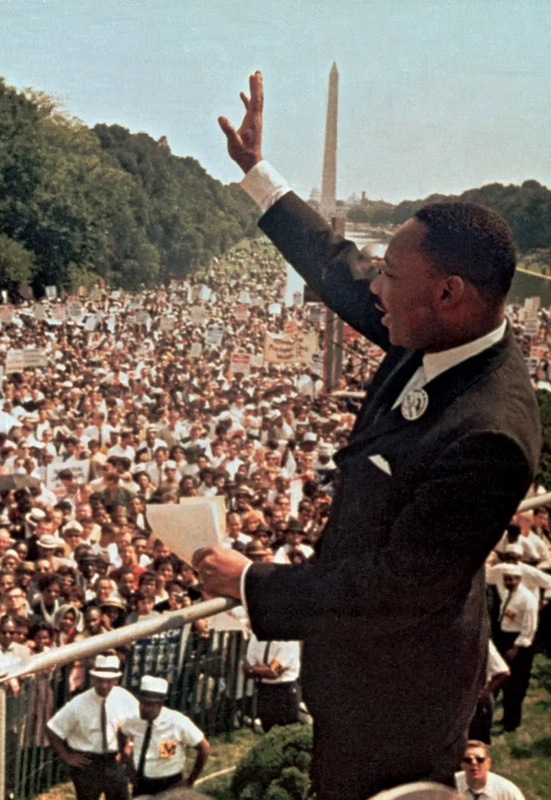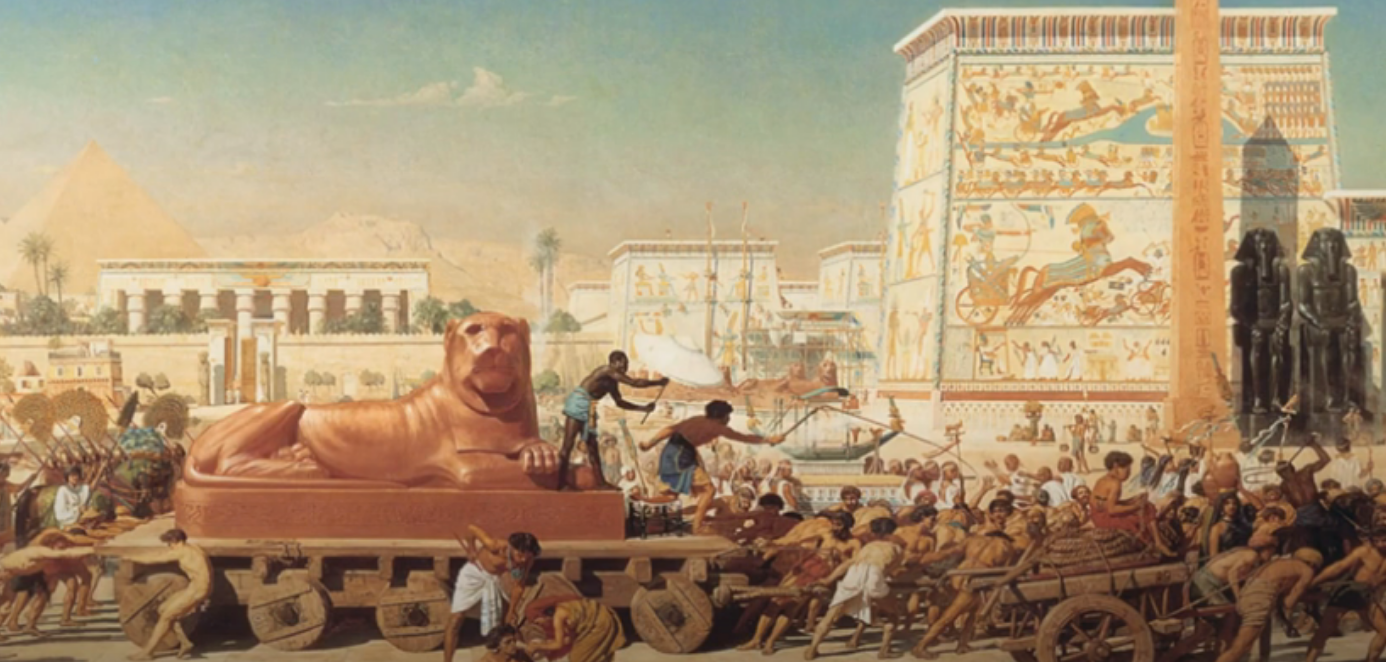| Dr. Martin Luther King's "I Have a Dream" speech invoked the prophetic call for people of all colors and creeds, "Jews and gentiles," to walk together "free at last." Now 60 years later, the dream is yet only partly fulfilled – and not only for African-Americans. This troubled era – and this week's pivotal Torah portion at the precipice of ancient Israelite liberation from Egyptian bondage – reminds us that our own prophetic dream of a world truly free and redeemed from bondage remains only partly fulfilled. And, now more than ever, it's up to us. |
By Rabbi David Evan Markus
Vaera 5784 (2024)
Amidst the stunningly beautiful tapestry of global Jewish diversity, part of what weaves Jews together is a common core narrative. Every Passover, Jews worldwide recite and are called to re-live these fateful words from the Haggadah:
Vaera 5784 (2024)
Amidst the stunningly beautiful tapestry of global Jewish diversity, part of what weaves Jews together is a common core narrative. Every Passover, Jews worldwide recite and are called to re-live these fateful words from the Haggadah:
This common perspective on Jewish ancestry, helps make us what we are as a people and a spiritual community. Fully 36 times, Torah justifies one or another mitzvah in terms of our liberation from Egyptian bondage. Fully 36 times, Torah proclaims, in essence, "Be kind, for you experienced cruelty. Free the oppressed, for you know the taskmaster's lash. Care for the stranger, because you know the stranger's heart, for you were enslaved to Pharaoh in Egypt."
This is who we are supposed to be, our Calling and Identity 101. We are supposed to stand for human dignity, that none should subjugate another on our watch.
This clarion call has infused history's most every liberation movement that followed. There's a reason the African-American experience, while different from the ancient Jewish experience, draws so directly from our spiritual ancestors' experience of liberation from bondage.
Dr. Martin Luther King knew it in his bones. He drew the strength of his clarion call to equal rights and equal dignity from the great drama of this week's Torah portion. God sends Moshe from a Burning Bush with a message to Pharaoh that echoes through history: "Let My People Go" (Exodus 7:16). From Pharaoh's resistance followed terrible plagues – seven in this week's Torah portion, the final three next week.
Much as it took calamity to shake ancient Egypt out of the slave business, MLK worried that it would take calamity to shake 1960s society out of the Jim Crow business. While MLK followed the path of nonviolence, he knew others would pursue violence as means of liberation.
But MLK knew, and we know, that true liberation often feels like grace. This kind of freedom transcends any notion of deserving it. Our spiritual ancestors weren't freed from slavery because they deserved it. The love and grace that truly free the human spirit are something else entirely.
And that's the point. Human dignity and equal justice are birthrights. Our rights to them by definition cannot be earned: they are the essential rightness of things, too often scorned by human wrong. That's why, according to Jewish tradition, God acted alone to free Israel – without petitions, advocacy, fundraising, meetings, registering voters, protests, marches and lawsuits. God acted alone because monotheism, our Calling and Identity 101, and the right of a people to be shine free in the light of dignity, was a sacred tree that needed to be planted.
Today we are living branches from that ancient tree. And now it's up to each of us to tend its flowers of freedom for ourselves, each other, our descendants, our neighbors, people like us, people not like us, people we love, people we fear, people we admire, people we hate, people we don't know – all people.
MLK knew, and we know, that nowadays human wrongs need our help to right them. He knew, and we know, what U.S. Ambassador Deborah Lipstadt teaches about hate. While antisemitism is the world's oldest hate, it just about never stands by itself. Antisemitic hate often covers or ignites other hatreds of whatever might seem most "other" or blameworthy. Islamophobia, homophobia, racism, misogyny and xenophobia get comfort and protection when antisemitism flourishes.
MLK knew that, too. He partnered closely with Rabbi Dr. Abraham Joshua Heschel, who walked arm in arm with MLK across the Pettis Bridge in Selma, Alabama, holding a Torah. Brothers arm in arm, sharing a legacy of subjugation, invoking the Sacred to inspire courage and rouse the nation.
I can't prove it, but I want to believe that Heschel rolled the Torah to this week's portion.
MLK often quoted the prophet Amos that eventually social “justice will roll down like waters, and righteousness like a mighty stream” (Amos 5:24). He knew, and we know, that it is in our hands to hasten that day.
This week's Torah portion launches our ancestral journey into the heart of bondage so that we can experience liberation anew. Feel again the Calling and Identity 101 of what it really means to be Jewish and do Jewish –
To seek and find the grace that truly frees.
To share that grace with everyone no matter what.
To galvanize us to make collective betterment real for a world that needs each of us – perhaps now more than ever – to walk arm in arm on bridges across uncrossable chasms.
We can. We must.
This is who we are supposed to be, our Calling and Identity 101. We are supposed to stand for human dignity, that none should subjugate another on our watch.
This clarion call has infused history's most every liberation movement that followed. There's a reason the African-American experience, while different from the ancient Jewish experience, draws so directly from our spiritual ancestors' experience of liberation from bondage.
Dr. Martin Luther King knew it in his bones. He drew the strength of his clarion call to equal rights and equal dignity from the great drama of this week's Torah portion. God sends Moshe from a Burning Bush with a message to Pharaoh that echoes through history: "Let My People Go" (Exodus 7:16). From Pharaoh's resistance followed terrible plagues – seven in this week's Torah portion, the final three next week.
Much as it took calamity to shake ancient Egypt out of the slave business, MLK worried that it would take calamity to shake 1960s society out of the Jim Crow business. While MLK followed the path of nonviolence, he knew others would pursue violence as means of liberation.
But MLK knew, and we know, that true liberation often feels like grace. This kind of freedom transcends any notion of deserving it. Our spiritual ancestors weren't freed from slavery because they deserved it. The love and grace that truly free the human spirit are something else entirely.
And that's the point. Human dignity and equal justice are birthrights. Our rights to them by definition cannot be earned: they are the essential rightness of things, too often scorned by human wrong. That's why, according to Jewish tradition, God acted alone to free Israel – without petitions, advocacy, fundraising, meetings, registering voters, protests, marches and lawsuits. God acted alone because monotheism, our Calling and Identity 101, and the right of a people to be shine free in the light of dignity, was a sacred tree that needed to be planted.
Today we are living branches from that ancient tree. And now it's up to each of us to tend its flowers of freedom for ourselves, each other, our descendants, our neighbors, people like us, people not like us, people we love, people we fear, people we admire, people we hate, people we don't know – all people.
MLK knew, and we know, that nowadays human wrongs need our help to right them. He knew, and we know, what U.S. Ambassador Deborah Lipstadt teaches about hate. While antisemitism is the world's oldest hate, it just about never stands by itself. Antisemitic hate often covers or ignites other hatreds of whatever might seem most "other" or blameworthy. Islamophobia, homophobia, racism, misogyny and xenophobia get comfort and protection when antisemitism flourishes.
MLK knew that, too. He partnered closely with Rabbi Dr. Abraham Joshua Heschel, who walked arm in arm with MLK across the Pettis Bridge in Selma, Alabama, holding a Torah. Brothers arm in arm, sharing a legacy of subjugation, invoking the Sacred to inspire courage and rouse the nation.
I can't prove it, but I want to believe that Heschel rolled the Torah to this week's portion.
MLK often quoted the prophet Amos that eventually social “justice will roll down like waters, and righteousness like a mighty stream” (Amos 5:24). He knew, and we know, that it is in our hands to hasten that day.
This week's Torah portion launches our ancestral journey into the heart of bondage so that we can experience liberation anew. Feel again the Calling and Identity 101 of what it really means to be Jewish and do Jewish –
To seek and find the grace that truly frees.
To share that grace with everyone no matter what.
To galvanize us to make collective betterment real for a world that needs each of us – perhaps now more than ever – to walk arm in arm on bridges across uncrossable chasms.
We can. We must.



 RSS Feed
RSS Feed